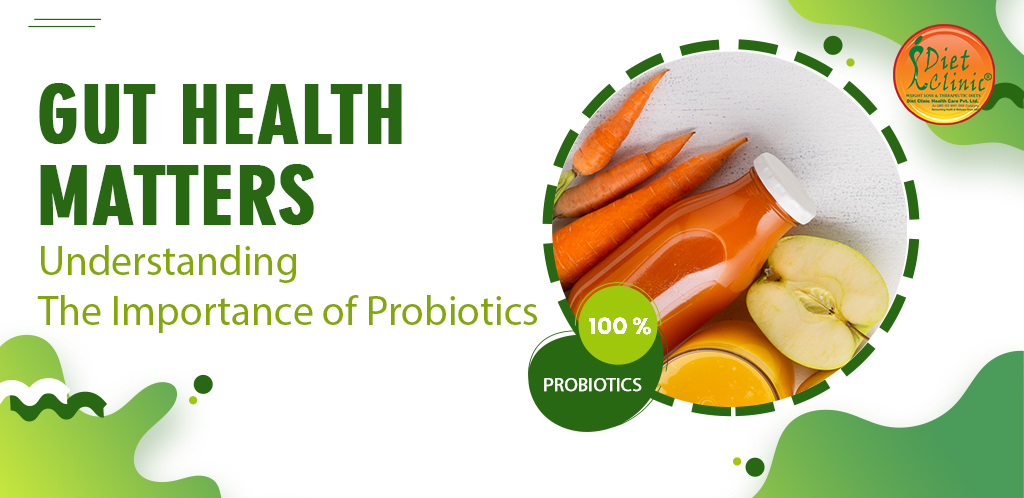
Dietician Sheela Seharawat
Gut Health Matters: Understanding the Importance of Probiotics
The intricate world within our bodies is a marvel of complexity and symbiosis. At the core of this intricate ecosystem lies our gut – a bustling community of trillions of microorganisms that play a crucial role in our overall health and well-being. While the idea of bacteria may have once conjured images of illness, we now understand that not all bacteria are harmful. In fact, a thriving community of beneficial bacteria is essential for our gut health, and probiotics are the superheroes that maintain this delicate balance. In this blog, we will delve into the fascinating world of gut health, unravel the significance of probiotics, and explore how they contribute to our vitality.
The Gut: A Microbial Wonderland
The gut, often referred to as the "second brain," is home to a diverse array of microorganisms, including bacteria, viruses, fungi, and more. This ecosystem, collectively known as the gut microbiota or gut microbiome, interacts with our body in multifaceted ways. It influences digestion, nutrient absorption, metabolism, immune function, and even our mental health.
Enter Probiotics: The Beneficial Bacteria
Probiotics are live microorganisms that confer health benefits when consumed in adequate amounts. These friendly bacteria take up residence in our gut and contribute to a harmonious environment. Probiotics aid digestion by breaking down complex carbohydrates, producing essential nutrients, and preventing the overgrowth of harmful bacteria.
The Role of Probiotics in Gut Health
Digestive Harmony: Probiotics help maintain a balanced gut flora, promoting efficient digestion and preventing issues like bloating, gas, and indigestion.
Immune Support: A significant portion of our immune system resides in the gut. Probiotics support immune function by regulating immune responses and enhancing the production of immune cells.
Mental Well-being: The gut-brain connection is a fascinating field of study. Probiotics may influence brain health and mood regulation, potentially playing a role in managing conditions like anxiety and depression.
Nutrient Absorption: Certain strains of probiotics assist in nutrient absorption, ensuring that our bodies efficiently utilize the essential vitamins and minerals we consume.
Inflammation Management: Probiotics may help regulate inflammation in the gut, reducing the risk of chronic inflammatory conditions.
Healthy Gut Barrier: Probiotics contribute to maintaining the integrity of the gut lining, preventing "leaky gut" and the associated health issues.
Sources of Probiotics
Probiotics can be obtained from both food sources and supplements:
Fermented Foods: Yogurt, kefir, sauerkraut, kimchi, miso, and kombucha are rich in probiotics. Including these foods in your diet can naturally boost your probiotic intake.
Probiotic Supplements: If you struggle to consume probiotic-rich foods regularly, supplements can provide a convenient and reliable source of beneficial bacteria.
Prebiotics: Prebiotics are non-digestible fibers that serve as food for probiotics. Incorporating prebiotic-rich foods like onions, garlic, bananas, and whole grains can support the growth of beneficial bacteria in your gut.
Choosing the Right Probiotic
When selecting a probiotic supplement, it's essential to consider the following factors:
Strain Diversity: Look for a supplement that contains a variety of strains. Different strains have distinct benefits, and a diverse microbiome is associated with better health.
Colony Forming Units (CFUs): CFUs indicate the number of viable bacteria in the supplement. Higher CFUs don't necessarily mean better; what matters is the right balance for your needs.
Targeted Formulas: Some probiotics are formulated for specific health concerns, such as gut health, immune support, or women's health. Choose a formula that aligns with your goals.
Survivability: Probiotics need to survive the journey through the acidic stomach to reach the intestines. Look for strains with evidence of survivability.
Cultivating a Gut-Friendly Lifestyle
Incorporating probiotics into your routine is just one piece of the gut health puzzle. Here are some additional tips to promote a thriving gut microbiome:
Diet Diversity: Consume a wide variety of whole foods, including fruits, vegetables, whole grains, and lean proteins. A diverse diet encourages a diverse gut microbiome.
Fiber-Rich Foods: Fiber supports the growth of beneficial bacteria. Incorporate foods like legumes, whole grains, fruits, and vegetables.
Mindful Eating: Eat slowly, chew thoroughly, and practice mindful eating to aid digestion and support a healthy gut.
Stay Hydrated: Drinking enough water is essential for maintaining gut health and promoting regular bowel movements.
Manage Stress: Chronic stress can impact gut health. Engage in stress-reducing activities like yoga, meditation, deep breathing, and spending time in nature.
Physical Activity: Regular exercise supports a healthy gut by promoting diverse microbial communities.
Adequate Sleep: Prioritize quality sleep, as it plays a vital role in maintaining gut health and overall well-being.
Incorporating probiotics and adopting a gut-friendly lifestyle can yield transformative effects on your health. The intricate dance between
.png)






